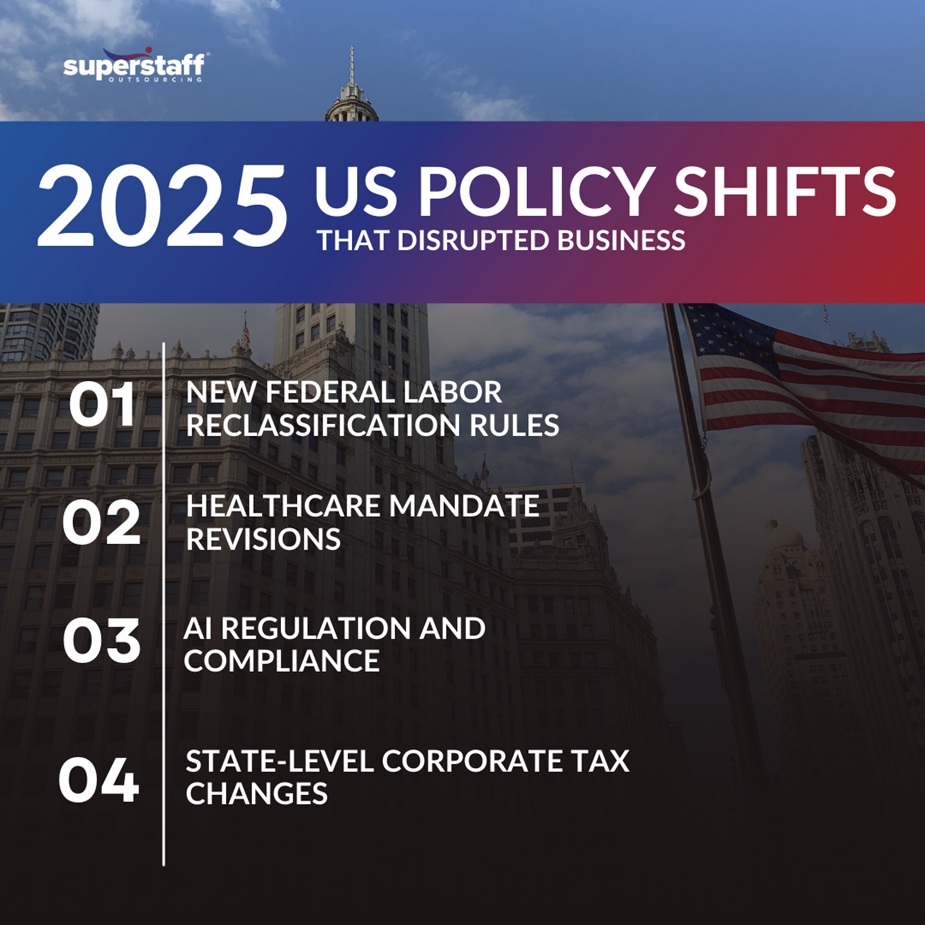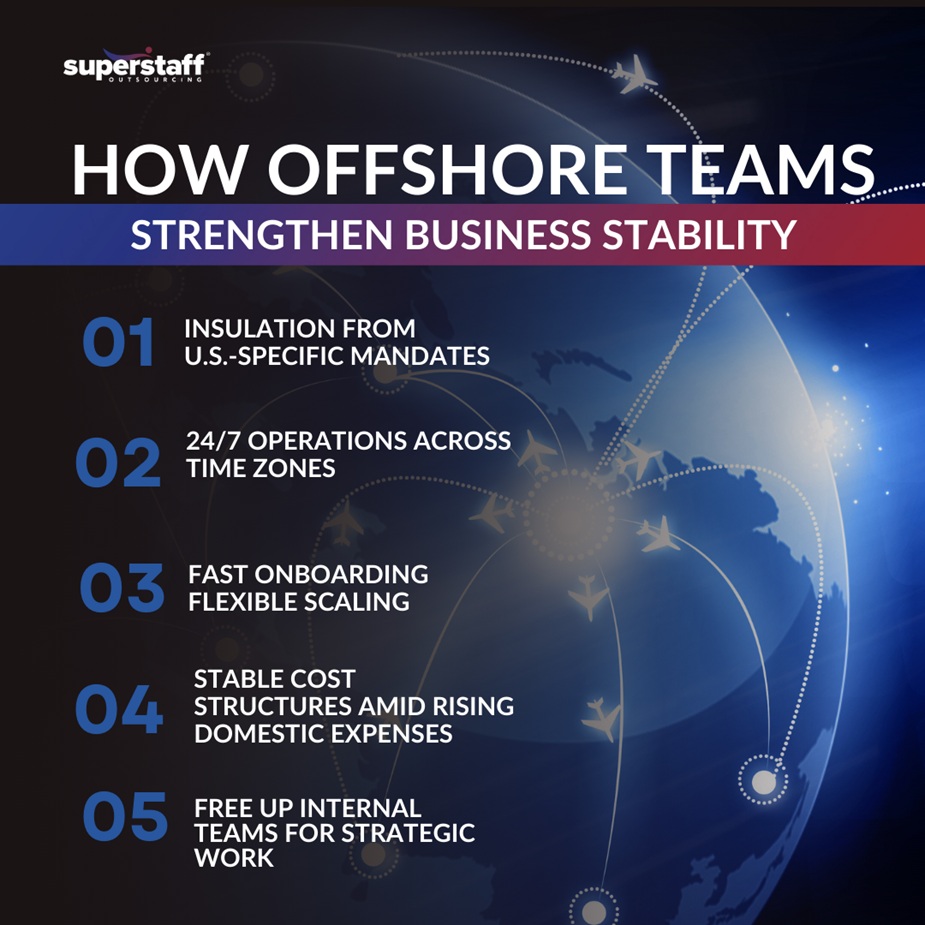
When U.S. policy shifts faster than your business can respond, offshore teams for business stability are no longer optional—they’re essential.
In 2025, businesses are navigating one of the most volatile regulatory environments in over a decade. From sudden tax reforms and aggressive AI regulations to evolving labor classifications and changing healthcare mandates, the pace of change is relentless.
Today’s executives aren’t just leading operations—they’re also interpreting legislation, managing risk, and adjusting strategy on the fly. The result? Constant uncertainty that makes it harder to plan, allocate resources, or scale effectively.
While some companies try to absorb the chaos internally, others are taking a smarter path: building offshore teams for business stability. These teams serve as steady, scalable hubs that continue to deliver—no matter what’s happening in Washington or Wall Street.
In this blog, we’ll dive into how offshore outsourcing empowers leaders to stay resilient, reduce operational risk, and preserve agility during times of policy disruption.
Fast-Moving U.S. Policies Are Disrupting Business Operations
From compliance regulations to labor mandates, U.S. businesses are navigating constant change.
2025 has already brought several landmark developments:

- Labor reclassification rules from the U.S. Department of Labor, redefining what qualifies as a full-time employee versus an independent contractor. This has created significant cost and compliance implications for businesses across sectors.
- A new wave of AI legislation, including restrictions on how generative AI tools can be used in customer service and data management. These rules vary by state and are putting pressure on companies to update internal protocols—fast.
- Healthcare mandate revisions, especially regarding employer contributions and reporting standards for businesses with 50+ employees. These changes affect both HR strategy and benefits administration.
- Corporate tax updates with changes to deductible expense limits and new regional surtaxes in states like California and New York, increasing the cost of doing business domestically.
All of this creates a reactive environment. One policy update can mean redoing compliance frameworks, restructuring teams, or even scaling down operations to stay financially viable.
The result? An overwhelming operational burden on internal teams, making it harder for leaders to focus on innovation and growth.
But what if your core operations weren’t solely tied to U.S. policy?
Offshore Teams Offer Business Continuity and Cost Control
Offshore outsourcing is not just about cost savings—it’s about ensuring continuity, adaptability, and operational balance when things at home become unpredictable.
By partnering with offshore teams in stable business environments like the Philippines and Colombia, companies gain several strategic advantages:
1. Insulation from U.S.-Specific Regulatory Risk
An offshore team operates under different employment laws and is not subject to sudden U.S. labor mandates, making it a valuable buffer during domestic policy shifts. For example, if the U.S. redefines overtime pay rules or changes employer-sponsored healthcare requirements, those updates don’t apply to your Philippine or Colombian staff. Your business keeps running while your U.S. counterparts are stuck in compliance limbo.
2. Predictable Cost Structures
Rising domestic compliance costs—from state-mandated paid leave to employer tax contributions—can disrupt your budget mid-year. Offshore teams offer stable labor costs, often under fixed-rate contracts. This allows for better planning and less volatility in financial forecasting.
For midmarket firms managing multiple service lines (customer support, data entry, order fulfillment), knowing your per-agent cost won’t unexpectedly double is a strategic advantage.
3. Built-In 24/7 Support
Time zone advantages mean your offshore team can work while you sleep. This is especially useful for companies needing after-hours support, international coverage, or real-time responses to late-breaking policy changes (e.g., new IRS reporting deadlines or unexpected state mandates).
4. Continuous Operations During Domestic Disruptions
Offshore teams can keep business functions moving even when U.S. offices are forced to pause. Whether it’s a government shutdown, legal review period, or labor strike, your offshore talent ensures the business doesn’t stall.
Outsourcing Adds Operational Agility
Agility isn’t a buzzword—it’s a necessity. In today’s regulatory climate, companies must react to change faster than ever before.
But change requires manpower, time, and focus—three things many internal teams can’t spare when scrambling to adjust to new rules.
This is where outsourcing shines.
1. Rapid Scaling Without Long-Term Risk
Offshore partners like SuperStaff can scale teams up or down based on workload spikes tied to policy changes. For instance, if a new regulation increases reporting requirements, you can add data processing agents to meet the deadline—without committing to full-time hires.
2. Fast Onboarding of Pre-Trained Professionals
SuperStaff’s offshore teams are pre-trained in key industries like healthcare, insurance, e-commerce, and finance. That means we can plug into your workflows with minimal downtime, allowing you to respond to policy changes instantly.
Need more claims support due to a healthcare mandate? Need help verifying worker eligibility under new labor laws? We’ve got trained professionals ready to go.
3. Reallocate In-House Talent to Strategy
When offshore teams handle the execution, your internal teams can focus on navigating compliance, lobbying policy changes, or innovating new workflows to adapt. Outsourcing removes the busywork from your plate and frees you to lead.
Agility also translates to faster innovation cycles—essential for industries like tech, healthcare, and financial services where new rules can redefine entire product categories.
Real-World Scenarios: How Offshore Teams Supported U.S. Companies During Policy Shifts

Let’s look at how real companies have used offshore outsourcing to protect operations during policy upheavals:
Case 1: Fintech Firm Navigates New Reporting Rules
A U.S.-based fintech startup faced increased scrutiny under IRS Form 1099 revisions related to digital asset reporting. Compliance deadlines were tight, and penalties for errors were steep.
The solution? The company partnered with SuperStaff’s Colombian team to build a dedicated back-office unit. Within two weeks, 15 agents were trained to process transaction reports, run reconciliation checks, and prepare filings for the internal legal team.
Result: The startup met IRS requirements without overloading its lean internal staff, avoided penalties, and reported a 23% cost savings versus expanding its U.S. operations.
Case 2: Insurance Provider Scales Claims Processing in the Philippines
A midmarket health insurance company had to comply with expanded federal mandates requiring faster claims turnaround times and new EOB (Explanation of Benefits) disclosures.
Their U.S. team was already stretched thin. To meet policy timelines and avoid customer dissatisfaction, they offshored claims support to SuperStaff’s Philippines hub.
The offshore team was onboarded and fully operational within 12 business days. Tasks included documentation checks, customer follow-ups, and system updates.
Result: Claims processing times improved by 38%, and the company passed its federal audit with zero compliance flags.
Case 3: E-commerce Brand Adjusts to Labor Reclassification Mandates
After new federal gig economy rules went into effect, a growing U.S. e-commerce brand had to reevaluate its use of independent contractors for warehouse and fulfillment tasks.
Instead of reclassifying contractors—triggering significant cost hikes—the brand outsourced its CX and order verification to a team in Colombia.
By shifting these non-core roles offshore, they reduced reliance on U.S. gig workers and complied with the law—without sacrificing service levels.
Result: The company retained its fulfillment timelines, reduced overhead by 29%, and avoided the costs of converting 40+ contractors to full-time employees.
Why SuperStaff Is the Offshore Partner Built for Uncertainty
SuperStaff isn’t just another BPO vendor—we’re a partner built to thrive in uncertainty.
Our teams in the Philippines and Colombia are strategically positioned to offer both proactive problem-solving and responsive execution—no matter what the policy landscape looks like.
What Makes Us Different:
- End-to-End Outsourcing Solutions: From customer support and back office to AI support and KPO roles, we tailor offshore teams to your specific business model.
- Industry-Specific Talent: We hire professionals with backgrounds in healthcare, fintech, retail, logistics, and SaaS—so you don’t have to spend months on training.
- Compliance-Ready Infrastructure: Our facilities and protocols align with U.S. privacy laws, HIPAA, SOC 2, PCI-DSS, and more.
- Business Continuity Expertise: We’ve helped clients navigate economic slowdowns, legislative overhauls, and tech disruption—all while maintaining service excellence.
- Multilingual Capabilities: With fluency in English, Spanish, and more, we support companies serving multilingual markets or expanding globally.
SuperStaff is more than a stopgap—it’s your long-term partner in building a resilient, agile, and scalable business infrastructure.
The Broader Trend: Offshore Teams and U.S. Economic Policy
Here’s the larger context: Offshore outsourcing is no longer just about filling talent gaps or cutting costs. It’s become an essential risk management strategy for midmarket companies navigating the volatility of U.S. economic policy.
Recent trends include:
- Increased demand for hybrid work models with offshore extensions.
- Growing legislative complexity in AI, labor, and healthcare.
- More frequent state-by-state business tax shifts.
- Tighter federal audits of compliance standards.
Companies that proactively build global operating models are better positioned to absorb these shocks—without compromising service delivery or compliance.
According to Deloitte’s 2024 Global Outsourcing Survey, 73% of midmarket companies said that outsourcing “significantly improved their operational resilience” during policy disruption. SuperStaff clients echoed that sentiment in post-engagement reviews, citing speed, scalability, and subject matter expertise as top advantages.
Build Offshore Teams for Business Stability in an Unpredictable Market
In an era where U.S. policy can shift overnight, businesses need more than agility—they need stability. From labor law changes and healthcare mandates to new tax codes and tech regulations, the pace and scope of disruption in 2025 are unprecedented.
That’s why more companies are turning to offshore teams for business stability. By establishing reliable operations in the Philippines and Colombia, businesses can maintain continuity, control costs, and protect core functions—regardless of what’s happening in Washington.
Real-world success stories show how the right offshore strategy can help you navigate uncertainty, reduce risk, and support long-term growth.
At SuperStaff, we provide trusted, industry-specific offshore support that scales with your needs. Whether you’re just starting or expanding a global footprint, we’re here to help you build a strong, steady foundation.
Don’t wait for the next disruption to hit. Partner with SuperStaff to build offshore teams for business stability—and move forward with confidence.






